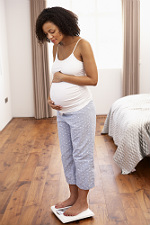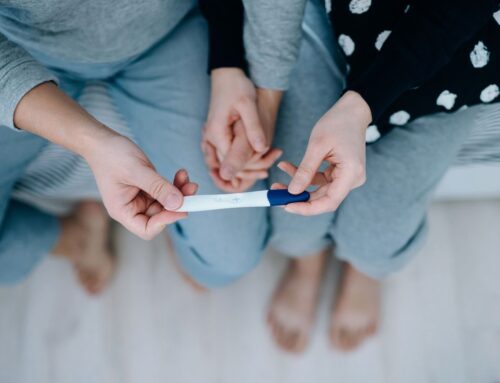Are you facing an unplanned pregnancy? Unsure which one of your options, adoption, abortion or parenting, is the best choice for you? This is the right time to start researching pregnancy, and you should try to get a thorough understanding of the nine months that may be ahead before you decide.
So what exactly happens during pregnancy? How will your body change and how do women commonly experience being pregnant?
In this article, we’ll answer many of those questions, by focusing on the physical changes that most women experience during the average 40-week pregnancy. As a result, our discussion will only delve into what’s happening inside the womb when it directly relates to the external symptoms of pregnancy that most women feel.
Three Trimesters Of Change: What Happens During Pregnancy?
During pregnancy, a woman’s body changes in substantial ways. These changes will come to affect almost every part of our bodies, and they all have one purpose: to prepare our bodies to carry and deliver a healthy child.
The average pregnancy lasts either 38 or 40 weeks, depending on what you consider the starting point. If you take conception, when your egg is fertilized by sperm, than pregnancies usually last 38 weeks. If you choose to consider the start as your last menstrual period before conception, than it takes 40 weeks. Most doctors divide the average pregnancy into three “trimesters,” phases around three months in length.
First Trimester Changes
Pregnancy’s first changes begin only days after an egg is fertilized, but most women don’t notice yet because the differences are so subtle. One change that you will probably notice is a missed period. If one of your eggs is fertilized, and it travels to the uterus, successfully implanting in the uterine lining, then menstruation won’t occur.
Swollen or Tender Breasts
Once your body realizes that it’s home to a fertilized egg, it starts ramping up production of two hormones: estrogen and progesterone. Estrogen helps the placenta, an organ essential to feeding a fetus, grow. But along with progesterone, it also prepares breasts for lactation. These hormones promote the growth of new tissue in breasts, and many women experience tenderness or swelling in their breasts as the first noticeable sign of pregnancy.
During the last month of the third trimester, you may notice that your areolas, the rings around your nipples, are getting darker or larger.
Morning Sickness
As the placenta grows, it starts producing more estrogen, as well as another hormone called human chorionic gonadotropin (HCG). While researchers still aren’t certain what causes the nausea and vomiting that around 85% of all pregnant women experience, the most well-established theory is that your body is reacting to increases in HCG.
While some women experience more severe nausea in the morning, during most pregnancies nausea and vomiting lasts all day, and it can strike at any time. And although it’s certainly uncomfortable, there is some evidence that women who experience morning sickness are more likely to deliver healthy babies than women who don’t.
Food Aversions & Cravings
In conjunction with morning sickness, you may also become particularly nauseated by certain tastes and smells. You might crave other foods, even ones that you didn’t like before.
 Many doctors think that this has something to do with the huge amounts of pregnancy hormones that you’re body is still getting used to, while others believe that your body is naturally steering you towards eating options that are healthier for a baby’s development.
Many doctors think that this has something to do with the huge amounts of pregnancy hormones that you’re body is still getting used to, while others believe that your body is naturally steering you towards eating options that are healthier for a baby’s development.
That last theory works well when you consider that some women, even those who smoked or drank before pregnancy, are suddenly nauseated by cigarettes and alcohol. But other women find themselves averse to healthy foods, too.
Fatigue
Many women experience fatigue, extreme tiredness, during the first trimester. Researchers believe that increases in progesterone make many women tired. But your body is also producing more blood than usual, to transport oxygen and nutrients to a developing baby, and the lower levels of blood sugar and pressure probably contribute to sleepiness, too.
Pregnancy hormones can also result in:
- mood swings
- indigestion
- constipation
- headaches
- dizziness
- heartburn
- acne breakouts
Weight Gain
During the first trimester, most women only gain around two pounds, but this can be different for women who were overweight or underweight before becoming pregnant.
Second Trimester Changes
By the fourth month of pregnancy, most women have seen morning sickness decrease substantially, if not go away altogether. Constipation, along with heartburn, may remain, or even become worse.
While your body is becoming used to increased hormones, you may find that the increases make you more emotional than usual, and you may have periods of forgetfulness, too. Dizziness is common, as is shortness of breath. Many women notice some unexpected benefits from all the hormones, though. Your nails, hair and skin may all appear healthier.
First Signs of Fetal Activity
It’s around 12 weeks that many women begin to feel a sign of the baby inside for the first time. At this point, the uterus has grown so large that it protrudes out of the pelvis and you may be able to feel it pushing a little above your pubic bone.
Some women will begin to “show” around this time, other’s won’t: it all depends on your height, weight and body’s natural shape, as well as the baby’s position in your uterus. By 20 weeks, most women begin to feel their baby’s first movements, little flutters in the stomach.
Your breasts will continue to grow; by week 20, they may have grown up to 2 cup sizes larger than pre-pregnancy. Around 23 to 24 weeks of pregnancy, your breasts may begin to produce colostrum, early milk that comes out in small drops.
Between 21 and 25 weeks, some women have Braxton-Hicks contractions. This feels like your abdomen or uterus squeezing tight, but most women don’t experience any pain. These contractions are your body’s way of practicing for labor.
Increased Blood Flow & Urination
Urination will probably become more frequent. Because your heart is pumping more blood (the total amount will peak around 24 weeks, the start of the third trimester), your kidney has to filter more blood as well. The increase in blood can also cause nosebleeds or bleeding from the gums, which are normal and unlikely to be anything to worry about.
With that said, if you are concerned about any of your pregnancy symptoms, contact your doctor immediately. Even if everything seems normal, discuss your symptoms in detail every time you visit the doctor just to be sure.
Third Trimester Changes
As your belly’s size increases, you may start to experience back pain around the 26th or 27th week of pregnancy, just as you’re entering the third trimester.
Most of the symptoms from before will continue, although dizziness often subsides around this time. For most women, morning sickness is a thing of the past.
Respiratory Changes
But the expanding uterus, which is making your belly larger and larger, also pushes up to touch your lungs above it. You may become short of breath much quicker than usual, and also have a stuffy noise, because your respiratory tract (including your nostrils) is being pumped with more blood than it’s used to. You may even notice an odd change in the sound of your voice caused by all this extra blood flow.
At the same time, continuing hormonal changes may make you feel irritable. You might sweat more than you usually do, too.
Constipation & Pigmentation Changes
Just as the uterus begins to push up against your lungs, it also applies pressure downwards, pressing against your lower intestines which may cause constipation. Hemorrhoids, blood vessels around the anus that become swollen, are a common result of this constipation. Hemorrhoids can hurt a lot, bleed or itch. The uterus’ extra pressure can push on your bladder, too, and you may find yourself urinating a little when you sneeze.
 Increased blood flow can cause swelling, especially in your legs. You might find varicose veins, swollen veins that can be blue or purple, on your legs or around your vagina.
Increased blood flow can cause swelling, especially in your legs. You might find varicose veins, swollen veins that can be blue or purple, on your legs or around your vagina.
For some women, cheeks and forehead will change color slightly, becoming blotchy or brown. A dark line, the linea negra, will likely appear at the center of your belly, crossing right through your belly button. All these pigmentation changes are the effects of pregnancy hormones.
Even Stranger Cravings?
A rare side effect (emphasis on “rare”), called pica, involves craving substances that have little to no nutritional value. Very little research has been done on the causes of pica during pregnancy, but some researchers believe that it may be due to an iron deficiency. Women with pica can crave things like:
- clay
- dirt
- laundry starch
- charcoal
- toothpaste
Pica is actually more common in children. According to the National Institutes for Health, as many as 10% to 32% of children between the ages of one and six demonstrate cravings for substances like clay and dirt. The Encyclopedia of Mental Disorders reports that “among young pregnant women, the onset of pica is frequently associated with a first pregnancy in late adolescence or early adulthood.”
Relaxin
As women near delivery, they begin to feel the effects of another hormone: relaxin. Relaxin does just what it sounds like, relaxing ligaments around the pelvis to make it easier to give birth. Relaxin has actually been doing stuff throughout pregnancy, softening uterine lining and promoting implantation of the fertilized egg, but now you may find it affecting the way you walk.
When A Baby “Drops”
Some time between weeks 33 and 40, the fetus may “drop,” descending into your pelvis. All babies “drop” at some point (this process is also called “lightening”), but for women who have had babies before, lightening might not happen until during labor. If it’s your first pregnancy, your baby will probably drop earlier than that, but it’s different for everyone.
Lightening will very likely change your relationship to your baby in a few ways, especially in relation to physical symptoms. Since the baby is now even lower in your pelvis, you may feel the urge to urinate even more often. Walking can become more difficult, too, and many women find themselves “waddling” around.
But a lot of pressure’s been taken off your stomach and lungs. Eating may become easier, as should breathing. If your baby drops (you will probably know as you feel pressure increasing lower than your stomach) any time during the four weeks before your due date, it’s most likely a common sign that your baby is getting ready to come out.
If you feel increased pressure before four weeks, contact your health care provider.
 How Much Weight Gain Is Normal?
How Much Weight Gain Is Normal?
During the first trimester, gaining from two to four pounds is generally considered healthy. After that, you should gain about one pound every week until the end of pregnancy.
All told, a woman with an average pre-pregnancy weight can expect to gain anywhere from 25 to 35 pounds. Women who were underweight will probably gain a little more, from 28 to 40 pounds. Overweight women generally gain from 15 to 25 pounds.





